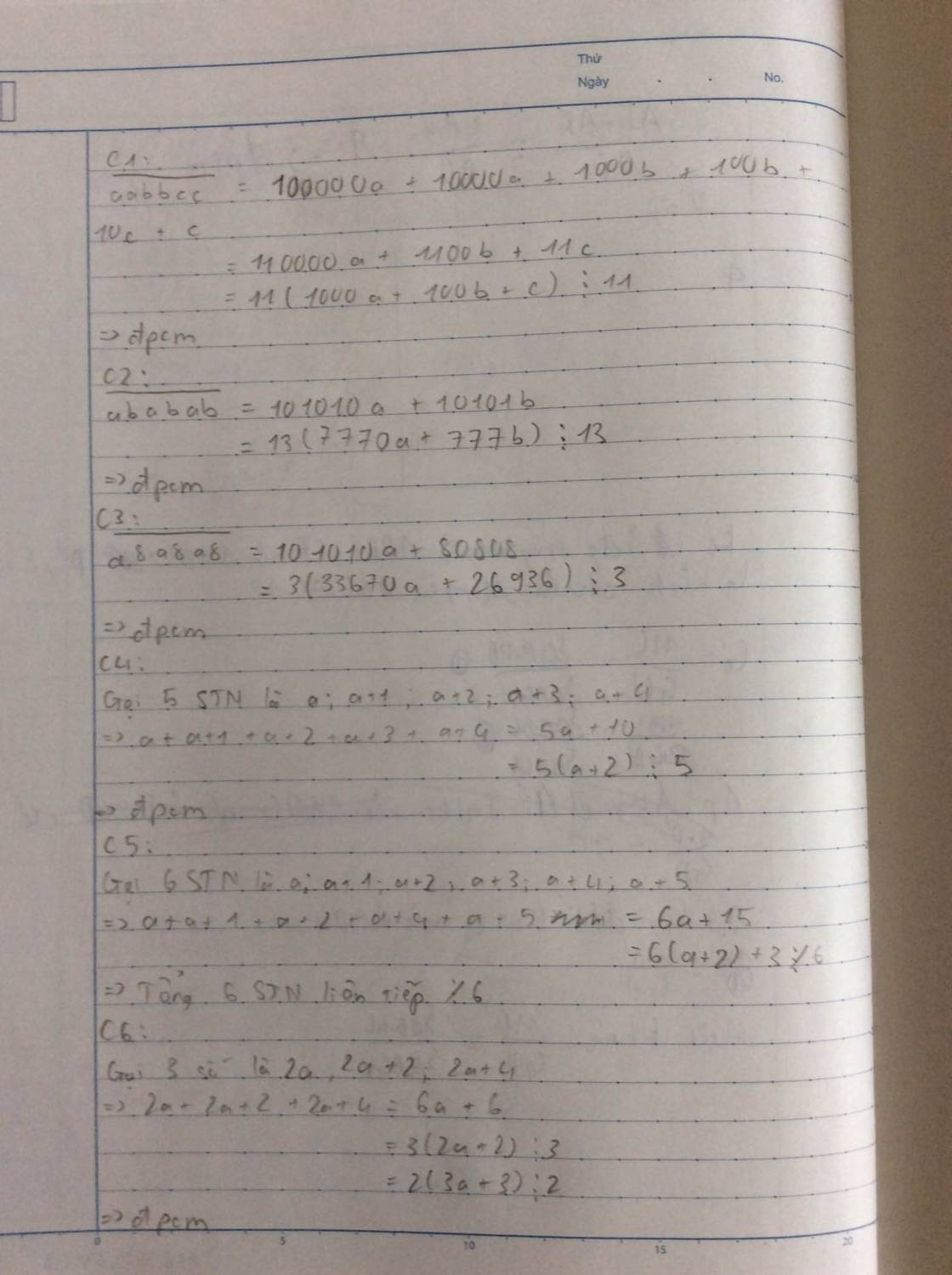Câu 4: Cho . Chứng minh rằng A chia hết cho 13
Hãy nhập câu hỏi của bạn vào đây, nếu là tài khoản VIP, bạn sẽ được ưu tiên trả lời.


Bg
C1: Ta có: n chia hết cho 11 dư 4 (n \(\inℕ\))
=> n = 11k + 4 (với k \(\inℕ\))
=> n2 = (11k)2 + 88k + 42
=> n2 = (11k)2 + 88k + 16
Vì (11k)2 \(⋮\)11, 88k \(⋮\)11 và 16 chia 11 dư 5
=> n2 chia 11 dư 5
=> ĐPCM
C2: Ta có: n = 13x + 7 (với x \(\inℕ\))
=> n2 - 10 = (13x)2 + 14.13x + 72 - 10
=> n2 - 10 = (13x)2 + 14.13x + 39
Vì (13x)2 \(⋮\)13, 14.13x \(⋮\)13 và 39 chia 13 nên n2 - 10 = (13x)2 + 14.13x + 39 \(⋮\)13
=> n2 - 10 \(⋮\)13
=> ĐPCM


Vì 13 là lẻ \(\Rightarrow\) 13, 132, 133, 134, 135, 136 là lẻ.
Mà lẻ + lẻ + lẻ + lẻ + lẻ + lẻ = chẵn nên 13 + 132 + 133 + 134 + 135 + 136 là chẵn. \(\Rightarrow\) 13 + 132 + 133 + 134 + 135 + 136 \(⋮\) 2
\(\Rightarrow\) ĐPCM

A=(13+132)+(133+134)+.......................+(1399+13100)
A=1.(13+132)+132.(13+132)+..............+1398.(13+132)
A=1.182+132.182+..........................+1398.182
A+182.(1+132+..............+1398) Chia hết cho 182
--> A chia hết cho 182

Ta có: A= 2 + 22 + 23 + ... + 260= (2 +22) + (23+ 24) + ... + (259 + 260).
= 2 x (2 + 1) + 23 x (2 + 1) + ... + 259 x (2 + 1).
= 2 x 3 + 23 x 3 + ... + 259 x 3.
= 3 x ( 2 + 23 + ... + 259).
Vì A = 3 x ( 2 + 23 + ... + 259) nên A chia hết cho 3.
A= (2 +22 + 23) + (24 + 25 + 26) + ... + (258 + 259 + 260).
= 2 x (1 + 2 + 22) + 24 x (1 + 2 + 22) + ... + 258 x (1 + 2 + 22).
= 2 x 7 + 24 x 7 + ... + 258 x 7.
= 7 x ( 2 + 24 + ... + 258).
Vì A = 7 x ( 2 + 24 + ... + 258) nên A chia hết cho 7.
A= (2 +22 + 23 + 24) + (25 + 26 + 27 + 28) + ... + (257 + 258 + 259 + 260).
= 2 x (1 + 2 + 22 + 23) + 25 x (1 + 2 + 22 + 23) + ... + 257 x (1 + 2 + 22 + 23).
= 2 x 15 + 25 x 15 + ... + 257 x 15.
= 15 x ( 2 + 24 + ... + 258).
Vì A = 15 x ( 2 + 24 + ... + 258) nên A chia hết cho 15.
Ta có: B= 3 + 33 + 35 + ... + 31991= (3 + 33 + 35) + (37+ 39 + 311 ) + ... + (31987 + 31989 + 31991).
= 3 x (1 + 32 + 34) + 37 x (1 + 32 + 34) + ... + 31987 x (1 + 32 + 34).
= 3 x 91 + 37 x 91 + ... + 31987 x 91= 3 x 7 x 13 + 37 x 7 x 13 + ... + 31987 x 7 x 13.
= 13 x ( 3 x 7 + 37 x 7 + ... + 31987 x 7).
Vì B = 13 x ( 3 x 7 + 37 x 7 + ... + 31987 x 7) nên B chia hết cho 13.
B= (3 + 33 + 35 + 37) + ... + (31985 + 31987 + 31989 + 31991).
= 3 x (1 + 32 + 34 + 36) + ... + 31985 x (1 + 32 + 34 + 36).
= 3 x 820 + ... + 31985 x 820= 3 x 20 x 41 + ... + 31985 x 20 x 41.
= 41 x ( 3 x 20 + .. + 31985 x 20)
Vì B =41 x ( 3 x 20 + .. + 31985 x 20) nên B chia hết cho 41.
a) Ta có: \(A=3+3^3+3^5+...+3^{1991}\)
\(=\left(3+3^3+3^5\right)+\left(3^7+3^9+3^{11}\right)+...+\left(3^{1987}+3^{1989}+3^{1991}\right)\)
\(=3\times\left(1+3^2+3^4\right)+3^7\times\left(1+3^2+3^4\right)+...+3^{1987}\times\left(1+3^2+3^4\right)\)
\(=3\times91+3^7\times91+...+3^{1987}\times91\)
\(=3\times7\times13+3^7\times7\times13+...+3^{1987}\times7\times13\)
\(=13\times\left(3\times7+3^7\times7+...+3^{1987}\times7\right)\)
Vì \(A=13\times\left(3\times7+3^7\times7+...+3^{1987}\times7\right)\)nên A chia hết cho 13.
b) Ta có: \(A=3+3^3+3^5+...+3^{1991}\)
\(=\left(3+3^3+3^5+3^7\right)+...+\left(3^{1985}+3^{1987}+3^{1989}+3^{1991}\right)\)
\(=3\times\left(1+3^2+3^4+3^6\right)+...+3^{1985}\times\left(1+3^2+3^4+3^6\right)\)
\(=3\times820+...+3^{1985}\times820\)
\(=3\times20\times41+...+3^{1985}\times20\times41\)
\(=41\times\left(3\times20+...+3^{1985}\times20\right)\)
Vì \(A=41\times\left(3\times20+...+3^{1985}\times20\right)\)nên A chia hết cho 41.

\(A=\left(1+3+3^2\right)+...+3^{99}\left(1+3+3^2\right)\)
\(=13\left(1+...+3^{99}\right)⋮13\)